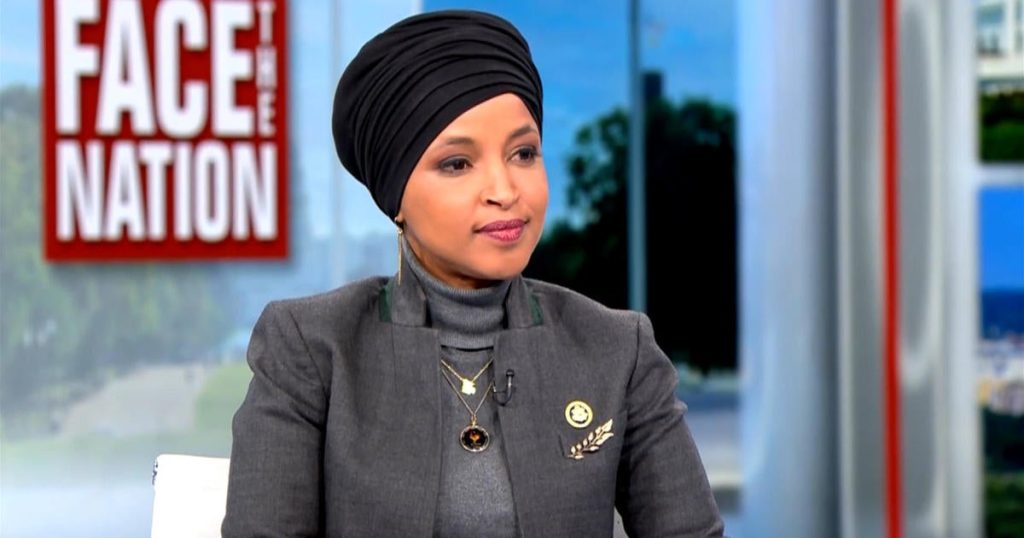Rep. Ilhan Omar: Trump’s Federal Gutting Lacks GOP Support
In a recent interview on CBS News’ Face the Nation with Margaret Brennan, Democratic Representative Ilhan Omar of Minnesota shed light on the current political dynamics in Washington, particularly focusing on the actions of the Trump administration. Rep. Omar emphasized that the administration’s recent moves to dismantle key federal agencies, such as USAID and the Department of Education, are being carried out without the necessary support from Republican lawmakers in Congress. She also highlighted the administration’s controversial decision to access records from the Treasury Department, implying that these actions are part of a broader effort to bypass traditional legislative processes.
Omar’s comments come at a time when the Trump administration has been increasingly relying on executive orders to push through its agenda, often bypassing Congress altogether. This approach has been met with criticism from Democrats, who argue that such unilateral actions undermine the checks and balances system enshrined in the U.S. Constitution. Rep. Omar, a vocal critic of the Trump administration, suggested that these moves are a clear indication that the president does not have the backing of his own party in Congress to implement such sweeping changes through traditional legislative means.
The Trump Administration’s Executive Orders: A Bypass of Congress
The Trump administration has faced significant scrutiny for its reliance on executive orders to advance its policy goals. From reshaping the immigration system to rolling back environmental regulations, the president has consistently used his executive authority to sidestep Congress. However, Rep. Omar’s recent remarks suggest that this strategy may not have the support of Republican lawmakers, many of whom have grown uneasy with the administration’s unconventional approach to governance.
One of the most significant executive actions taken by the Trump administration in recent months has been the dismantling of USAID and the Department of Education. These agencies play critical roles in shaping U.S. foreign policy and education systems, respectively. By targeting these institutions, the administration has sparked concerns among lawmakers and experts about the long-term consequences of such drastic measures. Rep. Omar’s comments imply that these actions are not only controversial but also lack the necessary political support to be sustainable in the long run.
Rep. Omar: Trump’s Actions Lack GOP Support
Rep. Ilhan Omar’s assertion that the Trump administration’s actions lack support among Republicans in Congress is a significant revelation. While the president has traditionally enjoyed strong backing from his party, there have been growing signs of divisions within the GOP. Some Republican lawmakers have expressed concerns about the administration’s approach to key policy issues, including its handling of federal agencies and its reliance on executive orders.
Omar’s comments also highlight the growing tension between the executive branch and Congress, particularly as the 2024 presidential election approaches. With the administration’s actions becoming increasingly contentious, it remains to be seen how Republican lawmakers will respond. Will they continue to support the president’s unconventional methods, or will they begin to distance themselves as the political landscape shifts? Rep. Omar’s remarks suggest that the latter may be the case, with many GOP lawmakers privately expressing unease about the administration’s direction.
The Implications of Trump’s Actions on Federal Agencies
The Trump administration’s efforts to dismantle USAID and the Department of Education have far-reaching implications for both domestic and international policy. USAID, in particular, plays a crucial role in administering foreign aid and promoting global development. By targeting this agency, the administration risks undermining U.S. influence abroad and jeopardizing critical development projects around the world.
Similarly, the Department of Education has been a cornerstone of the U.S. education system, providing vital support to schools and students across the country. Any efforts to dismantle this agency could have devastating consequences for education policy and the millions of Americans who rely on its programs. Rep. Omar’s comments underscore the concern that these actions are being taken without adequate consideration for their long-term impact.
Rep. Omar’s Perspective: A Call for Accountability
Rep. Ilhan Omar’s statements on Face the Nation also served as a call to action for her colleagues in Congress. She urged lawmakers to hold the Trump administration accountable for its actions, emphasizing the importance of upholding the constitutional balance of power. Omar’s comments reflect a broader sentiment among Democrats that the administration’s reliance on executive orders is a threat to democratic norms and the rule of law.
By speaking out on these issues, Rep. Omar is joining a growing chorus of voices advocating for greater transparency and accountability in government. Her remarks also highlight the ongoing challenges faced by lawmakers in addressing the administration’s unconventional approach to governance. As the political landscape continues to evolve, it will be important to watch how both Democrats and Republicans respond to these developments.
Conclusion: The Future of Trump’s Agenda in Congress
In summary, Rep. Ilhan Omar’s recent comments on CBS News provide valuable insight into the current state of affairs in Washington. Her assertion that the Trump administration’s actions lack support among Republican lawmakers in Congress raises important questions about the sustainability of the president’s agenda. As the administration continues to rely on executive orders to push through its policies, the response from Congress will be crucial in determining the ultimate success or failure of these efforts.
The implications of Trump’s actions on federal agencies like USAID and the Department of Education are profound, with potential consequences for both domestic and international policy. Rep. Omar’s call for accountability serves as a reminder of the importance of congressional oversight in ensuring that the executive branch does not overstep its authority. As the 2024 election approaches, the dynamics between the Trump administration and Congress will likely remain a central focus of political debate.












